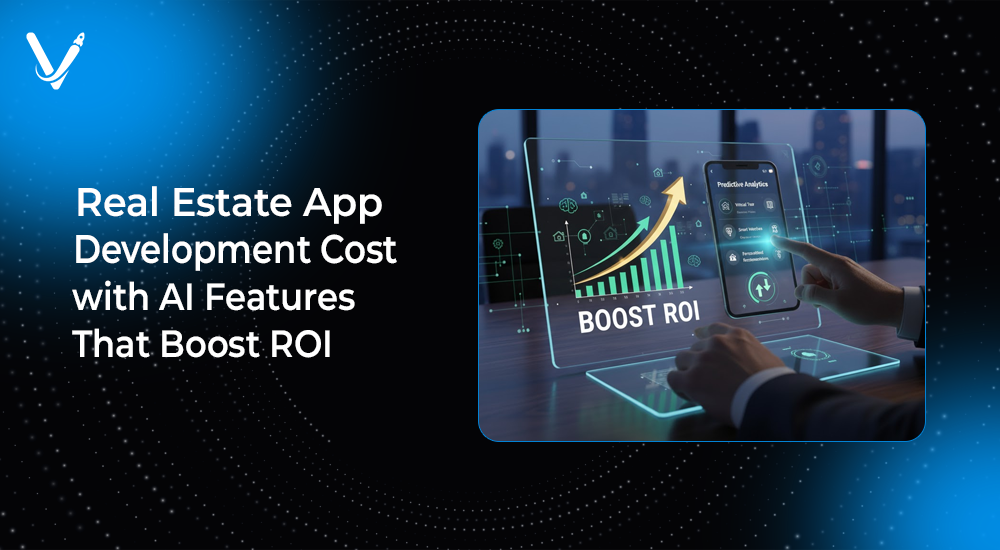Real Estate App Development Cost with AI Features That Boost ROI


- Oct 23, 2025



Key Takeaways
The real estate industry is no longer defined by paperwork, manual listings, or in-person viewings. In today’s digital-first world, most property seekers begin their journey through mobile apps that help them explore, compare, and shortlist properties. Whether it’s buying, renting, or investing, users expect an intuitive, fast, and intelligent experience.
Businesses that integrate Artificial Intelligence (AI) into their real estate apps are witnessing an entirely new level of customer engagement and profitability. AI does not just make apps “smart” — it personalizes every interaction, predicts user intent, and helps agents close deals faster.
This article will walk you through everything you need to know about real estate app development cost, AI-powered features, and how these innovations can boost your return on investment (ROI).
By the end, you’ll have a clear roadmap to plan your app budget, select must-have AI features, and understand why investing in intelligent automation is the smartest decision for your real estate business today.
A real estate app bridges the gap between property buyers, sellers, and agents. It provides an interactive digital platform where users can search listings, compare amenities, check pricing trends, contact agents, and even schedule virtual tours.
Apps like Zillow, Realtor.com, and Trulia have proven that customers prefer convenience and transparency over traditional real estate interactions. However, the competition is fierce — and the secret to standing out lies in AI integration.
With AI, your app can move beyond being a simple property directory. It can become a personalized property advisor that understands user preferences, recommends ideal homes, and simplifies decision-making.
Before diving into costs, it’s essential to understand the various types of real estate apps that can be built, as each comes with unique functionalities and pricing.
When estimating development costs, one must understand the core type of app being built. The choice determines your tech stack, backend complexity, and data integrations.
These are the most common real estate apps that allow users to browse, filter, and compare properties based on budget, location, and amenities. Integrating AI here enhances search relevance and property recommendations.
These apps are designed for landlords or property managers to handle tenants, rent collection, maintenance requests, and lease renewals. AI can automate rent reminders, detect fraud, and forecast occupancy rates.
Investors use these platforms to analyze property value, ROI, and market trends. AI helps by predicting investment risks, estimating rental yields, and suggesting profitable opportunities.
AI and AR (Augmented Reality) power these immersive platforms, allowing users to explore properties virtually. These are ideal for international buyers or developers with under-construction projects.
These apps focus on managing leads, scheduling visits, communication tracking, and AI-driven lead scoring for better sales prioritization.
The type of app you select becomes the foundation of your cost estimation and feature planning.
Developing a real estate app can cost anywhere between $30,000 to $250,000+, depending on its complexity, target platform, and AI integrations. Let’s break down the key factors that affect cost.
A simple property listing app with basic filters and contact forms costs much less than a full-fledged AI-powered real estate ecosystem with predictive analytics and automation.
Real estate users expect clean visuals, intuitive filters, and map-based navigation. A sophisticated UI that incorporates personalization and minimalism increases development hours but drives stronger engagement.
A scalable backend to handle thousands of listings, high-quality images, and AI computation adds to the cost. Real estate apps often rely on cloud services like AWS or Google Cloud for reliability.
Essential tools like Google Maps, MLS APIs (Multiple Listing Service), chat APIs, and payment gateways influence total expenses.
Adding Artificial Intelligence changes the equation. You need data pipelines, model training, recommendation systems, and predictive algorithms. While upfront costs increase, long-term ROI skyrockets through automation and better conversion.
Regular updates, bug fixes, and server costs add around 15–20% of the initial development cost annually.
AI in real estate apps goes far beyond simple automation. It transforms how buyers explore properties, how agents sell, and how investors plan portfolios. Here’s how each AI-driven feature contributes directly to ROI growth.
AI algorithms study user behavior, search patterns, and budget preferences to suggest the most relevant properties. Instead of sifting through hundreds of listings, users instantly see homes matching their lifestyle — improving engagement and conversion.
Machine learning models analyze past sales, market trends, and location insights to estimate real-time property values. This empowers users to make informed decisions and helps agents negotiate accurately.
An AI-powered chatbot acts as a 24/7 assistant, answering user queries, scheduling visits, and collecting leads. It saves agents countless hours and reduces dependency on manual support.
AI can analyze uploaded property photos to detect room types, conditions, and design features — enhancing listings automatically. It also helps remove low-quality or fraudulent images.
AI tracks market fluctuations, demand, and local trends to suggest optimal pricing strategies for sellers and investors — maximizing profitability.
AI evaluates leads based on engagement patterns, budget, and intent, automatically ranking them for agents. This improves response time and closes deals faster.
Understanding how users feel about properties, agents, or listings helps businesses refine offerings and improve trust.
AI identifies fake listings, duplicate ads, and suspicious user behavior — ensuring authenticity and safeguarding your platform reputation.
Machine learning algorithms predict future price trends, buyer demand, and regional property growth, empowering businesses to plan smarter investments.
Buyers can simply say, “Show me 3-bedroom apartments near the city center,” and get instant results. It increases accessibility and user satisfaction.
Each of these AI capabilities adds immense value to both users and businesses, directly contributing to higher ROI.
Artificial Intelligence does not just modernize your app — it creates tangible business outcomes. Here’s how AI-driven development enhances ROI in measurable ways:
Personalized recommendations and smart navigation keep users engaged longer. High engagement translates into better lead conversion rates.
AI ensures buyers see relevant properties, making them more likely to book visits or close deals. Even a small increase in conversion can generate exponential ROI.
AI chatbots, automated lead scoring, and self-updating listings reduce manual labor, saving businesses thousands annually.
Predictive insights help agents focus on high-value leads and set accurate prices, leading to more successful transactions.
AI helps target audiences effectively, recommending marketing campaigns that convert better and cost less.
By eliminating fake listings and providing real-time insights, your platform becomes a trusted choice — ensuring long-term user loyalty.
A detailed view of cost distribution helps understand where your investment goes during the development lifecycle.
| Phase | Estimated Cost Range | Description |
| Research & Planning | $3,000 – $7,000 | Market analysis, feature roadmap, wireframes |
| UI/UX Design | $5,000 – $15,000 | Visual design, prototyping, user flow |
| Frontend & Backend Development | $20,000 – $80,000 | Core functionality, APIs, user management |
| AI Integration | $15,000 – $60,000 | Chatbots, recommendation engines, analytics |
| Testing & QA | $5,000 – $12,000 | Manual and automated testing |
| Deployment & Launch | $2,000 – $6,000 | App Store & Play Store deployment |
| Maintenance & Updates | $5,000 – $20,000/year | Continuous improvements, bug fixes |
These costs vary depending on app size, platform, and complexity.
A successful real estate app relies on a robust technical foundation.
Frontend: React Native, Flutter, SwiftUI, Kotlin
Backend: Node.js, Python (FastAPI/Django), Ruby on Rails
Database: PostgreSQL, MongoDB, Firebase
AI/ML Frameworks: TensorFlow, PyTorch, Scikit-learn
APIs & Integrations: Google Maps API, Zillow API, Twilio, Stripe
Cloud & Hosting: AWS, Azure, Google Cloud
Choosing a scalable stack allows smooth AI integration and ensures future flexibility as your business expands.
To maximize ROI, your app should be designed not just to serve users — but also to generate consistent revenue streams.
Offer basic access for free while charging for advanced filters, virtual tours, or AI insights.
Agents or agencies can pay monthly or yearly subscriptions for premium visibility or advanced analytics dashboards.
Charge a small percentage on successful property deals or bookings made through the platform.
Display contextual ads for mortgage services, furniture, or property insurance that align with user intent.
Integrate with home improvement or relocation services for mutual lead generation.
Offer anonymized property trend reports and pricing predictions to investors or agencies as a premium product.
ROI doesn’t just depend on launch success. Sustainable performance requires long-term planning.
At Vasundhara Infotech, we combine deep technical expertise with creative innovation to build next-generation real estate apps that deliver tangible business value.
Our team specializes in:
We don’t just build apps; we build intelligent ecosystems that help businesses scale, automate, and dominate their markets.
With a track record of successful AI-driven mobile apps, we focus on scalability, performance, and measurable ROI from day one.
AI is no longer a luxury feature — it’s the foundation of the next era of real estate innovation. Intelligent automation, personalization, and predictive analytics empower users and streamline operations in ways traditional apps never could.
Building an AI-powered real estate app requires the right vision, development team, and long-term strategy. While initial costs may seem higher, the ROI through user engagement, efficiency, and data-driven insights makes it one of the most rewarding tech investments today.
Vasundhara Infotech stands ready to help you design, develop, and scale your next-generation AI-driven real estate app.
Let’s turn your idea into a high-performing platform that shapes the future of property business. Get in touch with us.
Copyright © 2025 Vasundhara Infotech. All Rights Reserved.